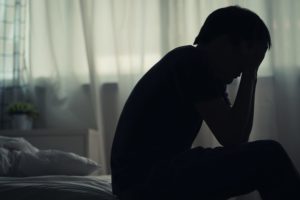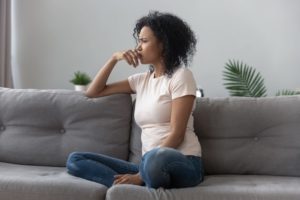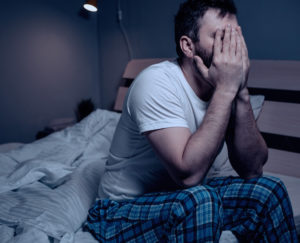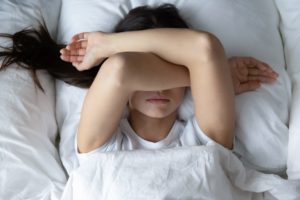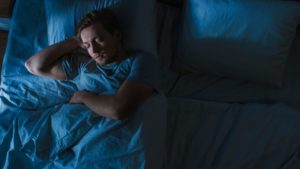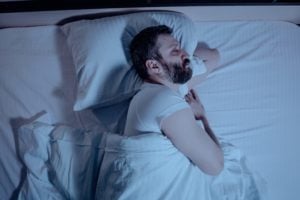PTSD and Sleep
Post-Traumatic Stress Disorder (PTSD) is characterized by a chronically heightened state of arousal after a traumatic event. PTSD often gets worse over time or develops insidiously, so that people may not realize they have it until many months after the traumatic event. The disease is more common in women, though it can happen to anybody. An estimated seven people out of 100 will experience PTSD during their lifetime.
PTSD and sleep have a complex relationship. Though sleep problems accompany many mental health conditions, sleep problems in PTSD are actually considered part of the disorder. Among the symptoms used to diagnose PTSD, two are directly related to sleep: hyperarousal and intrusion, which can manifest as insomnia and nightmares. Researchers are still trying to understand whether sleep problems precede PTSD or whether PTSD causes sleep problems.
How Do Sleep Issues Affect PTSD Symptoms?
Among people who experience a traumatic event, those who suffer significant sleep problems appear to be more likely to develop PTSD in the future. In fact, one of the earliest signs of PTSD is sleep disturbance, which often encompasses nightmares, insomnia, and fragmented rapid eye movement (REM) sleep.
Interestingly, sleep problems that precede the traumatic event may also play a role. One study found that people reporting nightmares before going to war were more likely to develop PTSD after coming back.
Once the disorder sets in, the presence of sleep problems appears to exacerbate PTSD symptoms . And even after treating daytime PTSD symptoms, many people find that insomnia still persists .
Sleep problems in PTSD interfere with the brain’s ability to process memories and emotions, slowing down the recovery process after a traumatic event. Moreover, many people with PTSD use alcohol or other substances to try to sleep better. Far from helping, these counterproductive coping mechanisms actually worsen sleep and can aggravate PTSD symptoms as well.

How PTSD Affects Sleep
Individuals with PTSD frequently have trouble falling asleep and awaken easily, often waking up many times throughout the night. Many people with PTSD also have nightmares. These issues result in disrupted, non-refreshing sleep.
Those with chronic pain, substance abuse , traumatic brain injury , depression , or other medical problems face an additional barrier to getting quality sleep. Certain sleep medications also interfere with REM sleep, which is the sleep stage during which we dream and an important sleep stage for dealing with traumatic memories.
The most common sleep problems in PTSD can be summed up in three categories:
- Insomnia: An estimated nine in ten people with PTSD suffer from insomnia. This is largely due to hyperarousal, in which the individual is unable to relax. It may also be a lingering effect of having been in a situation that required constant alertness at night. Insomnia in PTSD may also be self-perpetuating, as the stress of not being able to fall asleep eventually leads to maladaptive sleep behaviors such as daytime napping or substance abuse.
- Nightmares and Night Terrors: Nightmares and night terrors plague a majority of people with PTSD, leading to nighttime awakenings and making it difficult to get back to sleep. The content of these vivid dreams is sometimes related to past trauma, with many PTSD sufferers reporting repetitive nightmares. Nightmares are sometimes treated with imagery rehearsal therapy, in which the patient “rewrites” the script of the dream with a less threatening version during waking hours.
- Obstructive Sleep Apnea (OSA): It’s not entirely clear why there is a higher prevalence of OSA among people with PTSD, but it may be due to underlying factors such as chronic arousal or alcohol use. Studies have found that continuous positive airway pressure (CPAP) devices work well for treating OSA in people with PTSD and may even reduce nightmares. While not as effective, people who find CPAP devices triggering or claustrophobic may prefer to use a mandibular advancement device .
Treating PTSD-related sleep problems, as well as co-existing disorders such as depression, is an important part of resolving overall PTSD symptoms.
The Connection Between PTSD, Sleep, and the Brain
Researchers have found evidence that multiple overlapping brain regions are implicated in both PTSD and sleep problems, most notably the hippocampus, the amygdala, the anterior cingulate cortex, and the insular cortex. These brain regions are likely responsible for causing the patient to revisit the traumatic event in flashbacks and nightmares, as well as for maintaining a state of hyperarousal.
Studies have found that individuals with PTSD have a faster heart rate while sleeping, indicating an enhanced fight-or-flight response that maintains the body in a permanent state of hypervigilance. Unsurprisingly, hallmarks of disturbed sleep in PTSD sufferers include more stage one light sleep, less restorative slow-wave sleep, and fragmented REM sleep.
Another significant connection between sleep and PTSD may lie in the way the brain processes fear-inducing memories. During a traumatic event, the brain learns to associate a certain stimulus with a negative response. Long after the traumatic event, this association may be so strong that the person suffers a violent reaction every time they are presented with a similar stimulus.
Normally, this response is attenuated during a process called extinction memory, during which the brain gradually learns to dissociate the stimulus from the learned response. A significant amount of emotional memory processing is done during REM sleep, and researchers believe the REM sleep disruptions seen in PTSD sufferers may indicate an inability to efficiently process trauma.
Sleep loss may also cause daytime sleepiness and interfere with coping strategies, leaving people anxious and hypersensitive to triggers. The good news is that improving sleep seems to have corresponding effects on PTSD.
How to Sleep Better With PTSD
Elements of proper sleep hygiene can go a long way toward reducing PTSD sleep problems. These include:
- Keeping a cool, dark, and quiet sleep environment
- Reserving the bedroom for sleep and sex only
- Staying on a regular bedtime schedule
- Eating a healthy diet and avoiding caffeine before bedtime
- Getting regular exercise , which also helps tame hyperarousal
- Avoiding stressors before bedtime, including talking about your traumatic event
- Having a warm bath or reading a calming book before bedtime
- Turning off screens an hour before bedtime
- Using a white noise machine if you are sensitive to sounds
- Using meditation or other techniques to prevent rumination
You should sleep in a room that makes you feel safe, which may or may not be your bedroom. If you are uncomfortable sleeping in a dark room, a nightlight may provide a feeling of security.
People with PTSD are often afraid to go to sleep because they worry they will have nightmares. Unfortunately, this can lead to spending hours in bed with racing thoughts. If you have been in bed for 20 minutes and you can’t fall asleep, get out of bed, go to another room to do something relaxing, and only return to bed when you feel sleepy. This will help strengthen the mental association between your bed and sleep.
If you’re having trouble sleeping, or if you find yourself turning to substances such as drugs or alcohol to help you sleep, seek help from your doctor. They can help you find a therapist that provides cognitive behavioral therapy for insomnia (CBT-I), as well as PTSD-specific techniques such as imagery rehearsal therapy or exposure, relaxation, and rescripting therapy. They may also prescribe sleep medication, though this carries more risks and should be used with caution.
Learning to sleep soundly again after experiencing trauma may take some time, so don’t feel defeated if it doesn’t happen right away. Keep practicing healthy behaviors and working with your doctor, and you should eventually start to feel better. Because sleep and PTSD are so closely linked, ongoing therapy is extremely beneficial to those struggling with insomnia.
Sleep Tips for Partners of People With PTSD
While most efforts are focused on how to help someone with PTSD sleep, the partners of people with PTSD may also find it difficult to sleep soundly. For those with a partner who wakes up multiple times during the night, it may help to invest in a mattress that muffles sound and movement.
Nightmares and night terrors can be frightening and may cause your partner to lash out violently. Though you want to be there for your partner, you may find it necessary to sleep in a separate, nearby bedroom from time to time so you can get the restful sleep you need.
It may also be constructive to do exercise together with your partner during the day. In addition to improving sleep, developing healthy routines together can help you bond and help re-establish a sense of security for your partner.
Many caregivers struggle with feelings of guilt and a sense that they are responsible for “saving” their partner. However, pouring all your energy into helping another person can have a serious effect on your own mental health. Couples therapy, individual therapy, support groups, or a strong network of family and friends may help you manage your own thoughts and feelings to reduce the risk of burnout .

Still have questions? Ask our community!
Join our Sleep Care Community — a trusted hub of sleep health professionals, product specialists, and people just like you. Whether you need expert sleep advice for your insomnia or you’re searching for the perfect mattress, we’ve got you covered. Get personalized guidance from the experts who know sleep best.
References
20 Sources
-
National Institute of Mental Health. Post-Traumatic Stress Disorder. (2019, May)., Retrieved December 27, 2020, from
https://www.nimh.nih.gov/health/topics/post-traumatic-stress-disorder-ptsd/index.shtml -
Gehrman, P. (2020, March 26). Sleep Problems in Veterans with PTSD., Retrieved December 27, 2020, from
https://www.ptsd.va.gov/professional/treat/cooccurring/sleep_problems_vets.asp -
Pace-Schott, E. F., Germain, A., & Milad, M. R. (2015). Sleep and REM sleep disturbance in the pathophysiology of PTSD: the role of extinction memory. Biology of mood & anxiety disorders, 5, 3.
https://pubmed.ncbi.nlm.nih.gov/26034578/ -
van Liempt, S., van Zuiden, M., Westenberg, H., Super, A., & Vermetten, E. (2013). Impact of impaired sleep on the development of PTSD symptoms in combat veterans: a prospective longitudinal cohort study. Depression and anxiety, 30(5), 469–474.
https://onlinelibrary.wiley.com/doi/10.1002/da.22054 -
Brown, T. H., Mellman, T. A., Alfano, C. A., & Weems, C. F. (2011). Sleep fears, sleep disturbance, and PTSD symptoms in minority youth exposed to Hurricane Katrina. Journal of traumatic stress, 24(5), 575–580.
https://onlinelibrary.wiley.com/doi/10.1002/jts.20680 -
Pruiksma, K. E., Taylor, D. J., Wachen, J. S., Mintz, J., Young-McCaughan, S., Peterson, A. L., Yarvis, J. S., Borah, E. V., Dondanville, K. A., Litz, B. T., Hembree, E. A., & Resick, P. A. (2016). Residual sleep disturbances following PTSD treatment in active duty military personnel. Psychological trauma : theory, research, practice and policy, 8(6), 697–701.
http://doi.apa.org/getdoi.cfm?doi=10.1037/tra0000150 -
McHugh, R. K., Hu, M. C., Campbell, A. N., Hilario, E. Y., Weiss, R. D., & Hien, D. A. (2014). Changes in sleep disruption in the treatment of co-occurring posttraumatic stress disorder and substance use disorders. Journal of traumatic stress, 27(1), 82–89.
https://pubmed.ncbi.nlm.nih.gov/24473926/ -
Scott, J. C., Harb, G., Brownlow, J. A., Greene, J., Gur, R. C., & Ross, R. J. (2017). Verbal memory functioning moderates psychotherapy treatment response for PTSD-Related nightmares. Behaviour research and therapy, 91, 24–32.
https://linkinghub.elsevier.com/retrieve/pii/S000579671730013X -
Pigeon, W. R., Funderburk, J. S., Cross, W., Bishop, T. M., & Crean, H. F. (2019). Brief CBT for insomnia delivered in primary care to patients endorsing suicidal ideation: a proof-of-concept randomized clinical trial. Translational behavioral medicine, 9(6), 1169–1177.
https://academic.oup.com/tbm/article/9/6/1169/5528205 -
Department of Veterans Affairs and Department of Defense. (2017). VA/DOD Clinical Practice Guideline for the Management of Posttraumatic Stress Disorder and Acute Stress Disorder.
https://www.healthquality.va.gov/guidelines/MH/ptsd/VADoDPTSDCPGFinal012418.pdf -
Haberland, L., Höllmer, H., Schulz, H., Spiegelhalder, K., & Gorzka, R. (2019). Changes in sleep architecture in German Armed Forces personnel with posttraumatic stress disorder compared with depressed and healthy control subjects. PloS one, 14(4), e0215355.
https://pubmed.ncbi.nlm.nih.gov/30995285/ -
El-Solh, A. A., Homish, G. G., Ditursi, G., Lazarus, J., Rao, N., Adamo, D., & Kufel, T. (2017). A Randomized Crossover Trial Evaluating Continuous Positive Airway Pressure Versus Mandibular Advancement Device on Health Outcomes in Veterans With Posttraumatic Stress Disorder. Journal of clinical sleep medicine : JCSM : official publication of the American Academy of Sleep Medicine, 13(11), 1327–1335.
https://pubmed.ncbi.nlm.nih.gov/29065960/ -
van Liempt, S., Arends, J., Cluitmans, P. J., Westenberg, H. G., Kahn, R. S., & Vermetten, E. (2013). Sympathetic activity and hypothalamo-pituitary-adrenal axis activity during sleep in post-traumatic stress disorder: a study assessing polysomnography with simultaneous blood sampling. Psychoneuroendocrinology, 38(1), 155–165.
https://linkinghub.elsevier.com/retrieve/pii/S0306453012001928 -
A.D.A.M. Medical Encyclopedia. (2020, May 10). Post-traumatic stress disorder., Retrieved December 27, 2020, from
https://medlineplus.gov/ency/article/000925.htm -
A.D.A.M. Medical Encyclopedia. (2020, May 10). Post-traumatic stress disorder., Retrieved December 27, 2020, from
https://medlineplus.gov/ency/article/000925.htm -
Colvonen, P. J., Straus, L. D., Acheson, D., & Gehrman, P. (2019). A Review of the Relationship Between Emotional Learning and Memory, Sleep, and PTSD. Current psychiatry reports, 21(1), 2.
https://pubmed.ncbi.nlm.nih.gov/30661137/ -
Babson, K. A., Heinz, A. J., Ramirez, G., Puckett, M., Irons, J. G., Bonn-Miller, M. O., & Woodward, S. H. (2015). The interactive role of exercise and sleep on veteran recovery from symptoms of PTSD. Mental Health and Physical Activity, 8, 15-20.
https://linkinghub.elsevier.com/retrieve/pii/S1755296615000022 -
Lang, A. J., Malaktaris, A. L., Casmar, P., Baca, S. A., Golshan, S., Harrison, T., & Negi, L. (2019). Compassion Meditation for Posttraumatic Stress Disorder in Veterans: A Randomized Proof of Concept Study. Journal of traumatic stress, 32(2), 299–309.
https://onlinelibrary.wiley.com/doi/10.1002/jts.22397 -
Borders, A., Rothman, D. J., & McAndrew, L. M. (2015). Sleep problems may mediate associations between rumination and PTSD and depressive symptoms among OIF/OEF veterans. Psychological trauma : theory, research, practice and policy, 7(1), 76–84.
http://doi.apa.org/getdoi.cfm?doi=10.1037/a0036937 -
Yambo, T., & Johnson, M. (2014). An integrative review of the mental health of partners of veterans with combat-related posttraumatic stress disorder. Journal of the American Psychiatric Nurses Association, 20(1), 31–41.
http://journals.sagepub.com/doi/10.1177/1078390313516998







